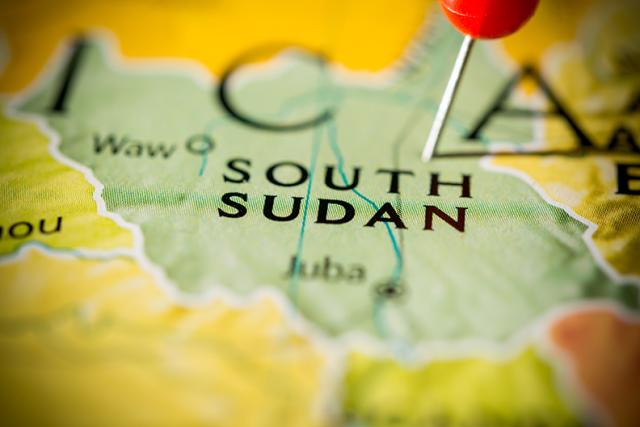
Contributors’ opinions are their own.
South Sudan placed much hope on its abundant oil reserves to secure the desired prosperity for its people following its separation from Republic of the Sudan. But the reality was stark for the young nation, as the country not only failed to maintain its pre-independence oil production level, but also ended up losing nearly 50% of its production due to the civil war.
The country seceded from Sudan in 2011 but plunged into civil war just over two years later after a political disagreement between President Salva Kiir and his former vice President Riek Machar exploded into a military confrontation. The fighting has uprooted about a quarter of the country’s 12 million population, slashed oil production and ruined the economy. This has resulted in the decline of oil production in the country to 130,000 barrels per day (bbl/d) compared to 350,000 bbl/d before South Sudan’s separation from the Republic of the Sudan. And the oil price crash in 2014 lowered oil income for the ravaged economy of the newly independent country.
South Sudan has 3.5 Bbbl of oil and 3 Tcf of natural gas in proven reserves, and is seen by companies as one of the last frontiers in energy exploration in sub-Saharan Africa. Currently, South Sudan’s oil production comes mainly from Upper Nile Field, which produces about 160,000 bbl/d.
Prior the civil war in South Sudan, the majority of oil used to be produced from Unity (AlWahda) Field with a production capacity of 200,000 bbl/d, which is under force majeure due to the civil war. Other oil fields that are currently out of production include the Palogue oil field, which holds a proven reserves of around 2.9 Bbbl, and produced around 22,000bbl/d. Other fields include Sarjas oil fields and Heglig field further north.
Attempts to attract foreign oil investors to invest in the country vast oil reserves have not been successful so far due to the lack of political stability and absence of security in the country.
While international oil companies have been reluctant to tapping oil reserves in South Sudan, Sudan and South Sudan have agreed to restore production in the northern fields of South Sudan, and to settle all disputes including the row over fees for pumping crude through an export pipeline. Exports through the pipeline was halted in 2012 because of a row with Sudan over fees.
Sudan’s gain from this is a $24.5/bbl fee that South Sudan pays to use Sudan’s pipeline to ship the oil to the Red Sea. This includes $9/bbl as transit fee, and $15/bbl as transitional fees.
The Republic of the Sudan lost three quarters of its oil output when South Sudan seceded in July 2011. It currently produces 72,000 bbl/d. Feeling the pinch, Sudan has now gone one step further by offering safe lodgings for oil workers, electricity and building materials. Sudan’s offer to help its southern neighbor could also be a strategy to discourage it from looking at alternative export routes—for example, via proposed pipelines in Kenya, Uganda, and Tanzania to the Indian Ocean, according to Bloomberg.
In early July, the two countries have also agreed to increase oil production through three phases before the end of 2018. “We plan to resume oil production from all fields, and we have agreed to fast track the restart of the production from the fields,” said Sudanese Petroleum Minister, Azhari Abdul-Qadir, in a statement.
The agreement aims to increase production capacity to 300,000 bbl/d, mainly from the Unity, Palogue and Sarjas oil fields located in South Sudan. With the help of Sudan, South Sudan hope to achieve its 2011 production levels within a year.
As part of the new agreement between the two countries, production from Unity oil field is set to be resumed within two months, according to Ezekiel Lul Gatkuoth, South Sudan’s Minister of Petroleum and Mining. “We expects to resume production in September from the Unity field,” Gatkuoth said in a TV interview.
The two countries have also agreed paying the arears transit fees which exceed $1.2 billion, where South Sudan pledge to pay to Sudan as part of the deal.
According Sudanese Petroleum Minister, his country agreed with South Sudan to get oil instead of cash, as it plans to use the oil to feed power station. As the ravaged economies of both countries suffered from the current situation, they are trying hard to make things work, but instability in South Sudan seems to be the main issue, as South Sudan government troops violated the country’s latest cease-fire signed early July, just hours after it began amid exchanged accusations between the government and the rebels. A previous cease-fire in December was also violated within hours, prompting a new push by the international community to threaten sanctions against those blocking the path to peace.
Recommended Reading
Baker Hughes to Supply Multi-Fuel Gas Tech to TURBINE-X
2025-03-17 - Baker Hughes will provide TURBINE-X with its NovaLT gas turbine is capable of running on different fuels including natural gas, various blends of natural gas and hydrogen.
SLB’s Big Boost from Digital Offsets Flat Trends in Oil, E&P
2025-01-20 - SLB’s digital revenue grew 20% in 2024 as customers continue to adopt the company's digital products, artificial intelligence and cloud computing.
E&P Seller Beware: The Buyer May be Armed with AI Intel
2025-02-18 - Go AI or leave money on the table, warned panelists in a NAPE program.
SLB Launches Electric Well Control Tech to Replace Hydraulics
2025-03-04 - SLB says the new systems reduce costs and provide real-time data for operators.
New Era Helium, Sharon AI Cement Permian Basin Data Center JV
2025-01-21 - New Era Helium and Sharon AI have created a JV, Texas Critical Data Centers, and are working on offtake gas supply agreements and site selection.
Comments
Add new comment
This conversation is moderated according to Hart Energy community rules. Please read the rules before joining the discussion. If you’re experiencing any technical problems, please contact our customer care team.






